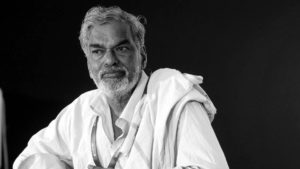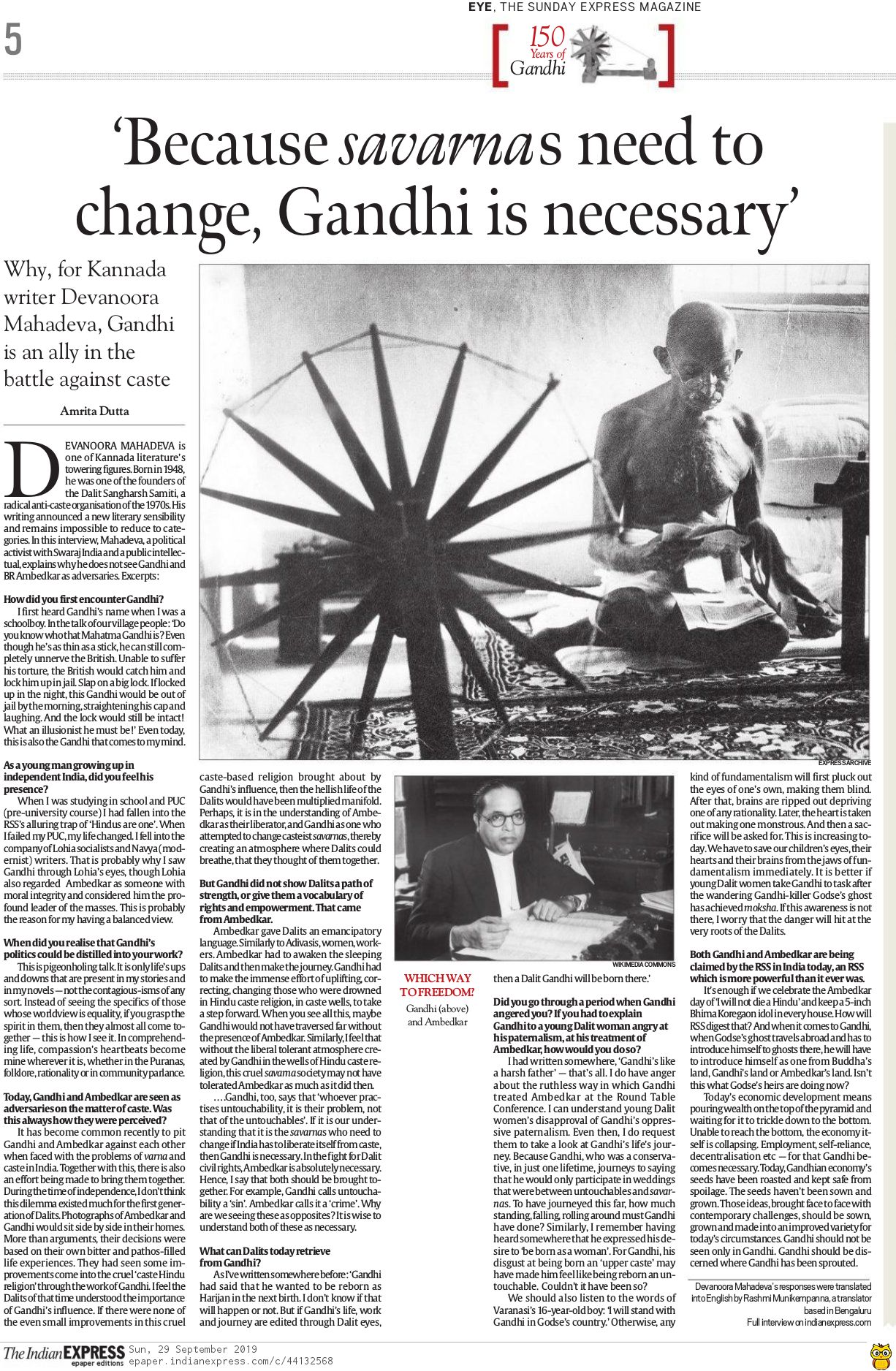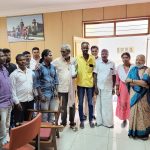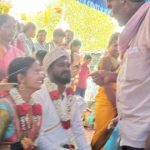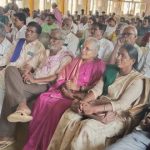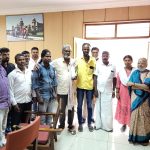‘If savarnas need to change, Gandhi is necessary-Devanoora Mahadeva,
Why, for Kannada writer Devanoora Mahadeva, Gandhi is an ally in the battle against caste.
Mahatma Gandhi 150th Birth Anniversary: ‘If savarnas need to change to liberate India from caste, then Gandhi is necessary’
I first heard Gandhi’s name when I was a school boy. In the talk of our village people – ‘Do you know who that Mahatma Gandhi is? Even though he’s as thin as a stick he would still completely unnerve even the British. Unable to suffer his torture, the British would catch him and lock him up in the jail. Slap on a big lock. If locked up in the night, this Gandhi would be out of jail by the morning, straightening his cap and laughing! And the lock would still be intact! What an illusionist he must be!” Even today, this is also the Gandhi that comes to my mind.
*As a young man growing up in independent India, did you feel his presence?
*When did you realise that Gandhi’s politics could be distilled into your work?
This is pigeonholing talk. It is only life’s ups and downs that are present in my stories and in my novels not the contagious-isms of any sort is what I think.
Instead of seeing the specifics of those whose worldview is equality, if you grasp the spirit in them then they almost all come together — this is how I see it. In comprehending life, compassion’s heartbeats become mine, wherever it is whether in the Puranas, folklore, rationality or in community parlance.
* Today, Gandhi and Ambedkar are seen as adversaries on the matter of caste. Was this always how they were perceived?
It has become common recently to pit Gandhi and Ambedkar against each other, when faced with the problems of varna and caste in India. Together with this, there is also an effort being made to bring Gandhi and Ambedkar together. During the time of Independence, I don’t think this dilemma existed much for the first generation of Dalits. The photos of Ambedkar and Gandhi would sit side by side in the homes of the first generation of Dalits. More than arguments, their decisions were based on their own bitter and pathos-filled life experiences. They had seen some improvements come into the cruel ‘caste Hindu religion’ through the work of Gandhi. I feel that the Dalits of that time understood the importance of Gandhi’s influence. If there were none of the even small improvements in this cruel caste-based religion brought about by Gandhi’s influence, then the hellish life of the Dalits would have been multiplied manifold. Perhaps, it is in the understanding of Ambedkar as their liberator, and Gandhi as one who attempted to change casteist savarnas, thereby creating an atmosphere where Dalits could breathe, that they thought of them together.
Ambedkar gave Dalits an emancipatory language. Similarly, to Adivasis, women, workers. Ambedkar had to awaken the sleeping Dalits and then make the journey. Gandhi had to make the immense effort of uplifting, correcting, changing those who were drowned in Hindu caste religion, in caste wells, to take a step forward. When you see all this, maybe Gandhi would not have traversed far without the presence of Ambedkar. Similarly, I feel that without the liberal tolerant atmosphere created by Gandhi in the wells of Hindu caste religion, then this cruel Savarna society may not have tolerated Ambedkar as much as it did then.
….Gandhi too says that ‘whoever practices untouchability, it is their problem, not that of the untouchables’. If it is our understanding that it is the Savarnas who need to change if India has to liberate itself from caste, then Gandhi is necessary. In the fight for Dalit civil rights, Ambedkar is absolutely necessary. Hence, I say that both should be brought together. Gandhi calls untouchability a ‘sin’. Ambedkar calls it a ‘crime’. Why are we seeing these as opposites? It is wise to understand both of these as necessary.
What can Dalits today retrieve from Gandhi?
As I’ve written somewhere before: ‘Gandhi had said that he wanted to be reborn as Harijan in the next birth. I don’t know if that will happen or not. But if Gandhi’s life, work and journey are edited through Dalit eyes, then a Dalit Gandhi will be born there.’
Did you go through a period when Gandhi angered you? If you had to explain Gandhi to a young Dalit woman angry at his paternalism, at his treatment of Ambedkar, how would you do so?
I must be from an ancient era. I had written somewhere ‘Gandhi’s like a harsh father’, that’s all. I do have anger about the ruthless way in which Gandhi treated Ambedkar at the Round Table Conference. I can understand young Dalit women’s disapproval of Gandhi’s oppressive paternalism. Even then, I do request them to take a look at Gandhi’s life’s journey. Because Gandhi, who was a conservative, in just one lifetime, journeys to saying that he would only participate in weddings that were between ‘untouchables’ and savarnas. To have journeyed this far, how much standing, falling, rolling around must Gandhi have done? Similarly, I remember having heard somewhere that he expressed his desire to ‘be born as a woman’. Even if as a thought, why does this desire to be reborn as an ‘untouchable’ or a woman arrive? His disgust at being born an ‘upper’ caste may have made him feel like being reborn an Untouchable and similarly his disgust at harsh paternalism may have made him feel like being reborn as a woman. Couldn’t it have been so?
We should also listen to the words of Varanasi’s 16-year-old boy: “I will stand with Gandhi in Godse’s country”. Otherwise, any kind of fundamentalism will first pluck out the eyes of one’s own, making them blind. After that, brains are ripped out depriving one of any rationality. Later, the heart is taken out making one monstrous. And then a sacrifice will be asked for. This is increasing today. We have to save our children’s eyes, their hearts and their brains from the jaws of fundamentalism immediately. It is better if young Dalit women take Gandhi to task after the wandering Gandhi-killer Godse’s ghost has achieved moksha. If this awareness is not there, I worry that the danger will hit at the very roots of the Dalits.
Both Gandhi and Ambedkar are being claimed by the RSS in India today, an RSS which is more powerful than it ever was. What implications does that have for us?
It’s enough if we celebrate the Ambedkar day of ‘I will not die a Hindu’ and keep a 5-inch Bhima Koregaon idol in every house. How will RSS digest that? And when it comes to Gandhi, when Godse’s ghost travels abroad, he will have to introduce himself as one from Buddha’s land, Gandhi’s land or Ambedkar’s land. Isn’t it exactly what Godse’s heirs are doing in the present?
Today’s economic development means pouring wealth on the top of the pyramid and waiting for it to trickle down to the bottom. Unable to reach the bottom the economy itself is collapsing. Employment, self-reliance, decentralisation etc –for all of this, Gandhi becomes necessary.
Today, Gandhian economy’s seeds have been roasted and kept safe from spoilage. The seeds haven’t been sown and grown. Those ideas, brought face to face with contemporary challenges, should be sown, grown and made into an improved variety for today’s circumstances. Gandhi should not be seen only in Gandhi. Gandhi should be discerned where Gandhi has been sprouted.
(Devanoora Mahadeva’s responses were translated into English by Rashmi Munikempanna, a translator based in Bengaluru)

